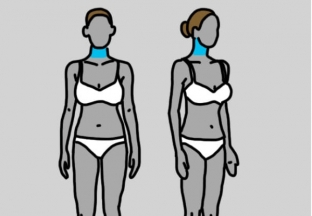If your thyroid is underactive, you may feel tired and gain weight for no reason. Moreover, an underactive thyroid gland can lead to depression and even problems with conceiving a child. For most people, hypothyroidism is associated with fatigue and weight gain, but the symptoms of hypothyroidism, according to endocrinologists, are more varied and can manifest themselves in different ways. Knowing how hypothyroidism manifests itself is necessary in order to seek help from a specialist in time and start treatment.
Common symptoms of hypothyroidism that appear most often
When the thyroid gland is underactive, it does not produce the proper amount of hormones. As a result, the processes in the body slow down, so the main symptom of hypothyroidism is lack of energy and fatigue. Patients often complain that it is difficult for them to get up in the morning, but they can fall asleep during the day anywhere and at any time.
In addition, as a result of the increase in energy expenditure, the metabolism slows down, due to which the person becomes sensitive to cold, and also begins the process of weight gain. If hypothyroidism is developed sufficiently, the metabolism can slow down by half.
However, some people with hypothyroidism may not get better, or if they do gain weight, it is due to fluid retention.

Unusual symptoms of hypothyroidism to report to your doctor
If you have not found the above "traditional" symptoms of hypothyroidism, it does not necessarily mean that the thyroid gland is working properly. There are rarer and less indicative signs of this disease, namely:
- Depression
Slowing down of the thyroid gland entails slowing down of the brain. The ability to focus in a person is reduced, there is a tendency to clinical depression. The role of hypothyroidism in the development of depression, according to endocrinologists, is underestimated.
- Memory disorders
While hypothyroidism can lead to memory problems, researchers do not think that this disease can lead to permanent cognitive dysfunction.
- Frequent constipation
One of the symptoms of hypothyroidism is frequent constipation, which occurs as a result of a slowdown in the digestive system.
- Dry skin
Thyroid hormones play a key role in skin health. Patients with hypothyroidism often complain of dry skin.
- Hair loss
Undiagnosed for several months, hypothyroidism manifests itself in hair loss.
- Irregular menstruation
The duration of the menstrual cycle in women with hypothyroidism may be longer or shorter than usual. An increase in blood volume is also possible.
- Infertility
Physicians who treat thyroid often check the thyroid gland. If the cause of infertility is thyroid dysfunction, treatment is usually successful and results in pregnancy.
- High cholesterol
Low levels of thyroid hormones and high levels of thyroid-stimulating hormone, which the body produces to stimulate the thyroid gland, can lead to high cholesterol levels.
In addition to these symptoms of hypothyroidism, facial puffiness, hoarseness, thin eyebrows, slow speech, problems with the perception of taste and smell may appear.
It is important to tell the doctor about possible symptoms of hypothyroidism in time in order to diagnose the disorder in time and start treating the disease. Treatment for hypothyroidism is usually simple and effective.






Add a comment